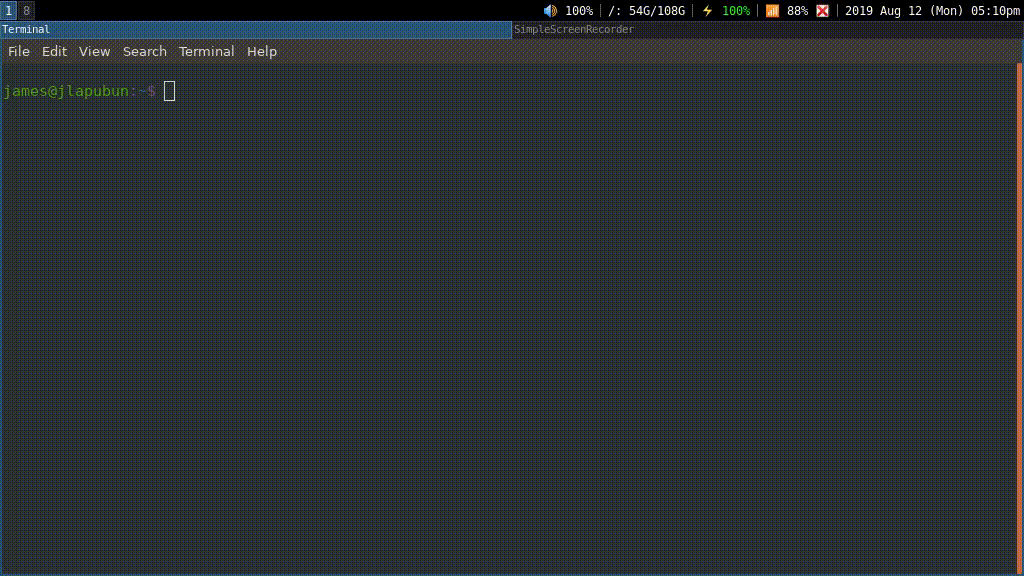A simple shell script that allows the user to create xrandr commands through dmenu. It is currently in a fully working state but I plan to keep developing it further.
The demo does not show resolutions changing as I cannot find a screen recorder that works across resolution changes but it works. Some debug information is left on in the demonstration to show the aspect ratio algorithm in play - this is turned off in the release.
- dmenu
- suckless-tools (ubuntu)
- notify-send
- libnotify-bin (ubuntu)
- xrandr
- x11-xserver-utils (ubuntu)
Move config_displays to your desired location within $PATH (e.g. $HOME/.local/bin/), ensure script has execute permissions (use chmod +x config_displays if not) and run the command after opening a new terminal.
If you just want to test out the script then you can change directory to where it resides and run it with ./config_displays without needing it in your $PATH.
Optionally, I bound one of my FN keys on my laptop to run the command to make the function more accessible. I achieved this by adding:
bindsym XF86Display exec --no-startup-id config_displays "Display Mode" to my i3 config ($HOME/.config/i3/config), change to a key of your preference and it should work fine.
Due to the use of the locate command to assign the resolutions file to a variable within the script, there's a high chance it won't locate it upon first use. This is because the locate command uses a database to locate files that is only updated on a daily basis.
If you have superuser privileges, you can update it manually by running sudo updatedb, otherwise reboot the system/wait a day and the script will be able to work fine there-on.
Entirely self-contained within one script, with no need to create external files.Only uses one additional file needed to confirm abnormal aspect ratios. Will be removed if I can find a more efficient solution.- Dynamically fetches outputs and resolutions, allowing for compatibility across multiple systems.
- Includes aspect ratio algorithm to figure out the ratio of any resolution, something that xrandr does not do.
- Only shows relevant resolutions on first pass, presenting the user with resolutions in their default aspect ratio.
- Provides positional options for non-primary displays.
- Ensures there is at least one active monitor at all times to prevent user from turning off all screens.
- An autoconfig option to use xrandr's recommended options for the current output.
- Isn't hindered by interlaced resolutions (e.g. 1920x1080i, as shown in the demo.)
- Options to go back a menu.
- Show compatible resolutions; currently not all resolutions are actually valid, despite xrandr displaying them.
- Improve aspect ratio algorithm to work better with weird ratio resolutions (e.g. 1366x768 returns 683:384, as shown in demo.) without the need for an additional file to compare against.
- Find a way to filter out outputs xrandr shows but you don't have.
- Countdown for the autoconfig feature in case of broken display.
- Code optimisation.
- Terminal version that doesn't require
dmenuornotify-sendto allow it to run on (almost) any system. - Option in the first menu to autoconfig for broken displays.
- More stuff I haven't thought of yet.
- Assigning config_displays_resolutions to a variable and using the locate command:
- I made this decision as testing showed that when the script is ran through the use of a shortcut (i3 config shortcut) rather than through the command-line would result in the
getrelativeresolutionsfunction returning incorrect results. I tried many different ways to overcome this issue and this fix worked. Will revist at some point.
- I made this decision as testing showed that when the script is ran through the use of a shortcut (i3 config shortcut) rather than through the command-line would result in the
That is due to xrandr's output, not from my script and from what I can surmise, it gets those outputs from /sys/devices/pci0000:00/0000:00:02.0/drm/card0/card0* or somewhere similar. Regardless, no resolutions will display under those outputs and the script will exit shortly after. A future plan is to devise a way to remove those phantom displays.
Again, that is also due to xrandr. I have tried to negate this by adding the aspect ratio function but further down the line I will try to remove resolutions that outright don't work. When I tried those resolutions on my machine, xrandr didn't do anything anyway.
Although measures have been put in place to try and prevent misconfigurations, there is the possibility something will go wrong. If the screen has only just gone black and you haven't pressed anything since, the program should be prompting you to allow xrandr autoconfig the output for you. Simply either press RIGHT once or type 'Yes' and press enter and xrandr should reconfigure the output for you. If that doesn't work, restarting the system should reset to defaults.
"There's resolutions missing from your document, preventing them being shown to me, when will you fix that?"
All resolutions provided have been sourced from a Wikipedia article, starting from 640x480 onwards as I doubt many people will be using anything smaller. You can append your own resolutions to the file as long as you follow the same format used within. I would appreciate it if you opened a pull request of your new version of the resolution file if you do so that it can be available for others also.
You can always open an issue on the Issues tab, or if you have a fix, you may want to fork the project and propose a pull request of your fix. All help is greatly appreciated.
